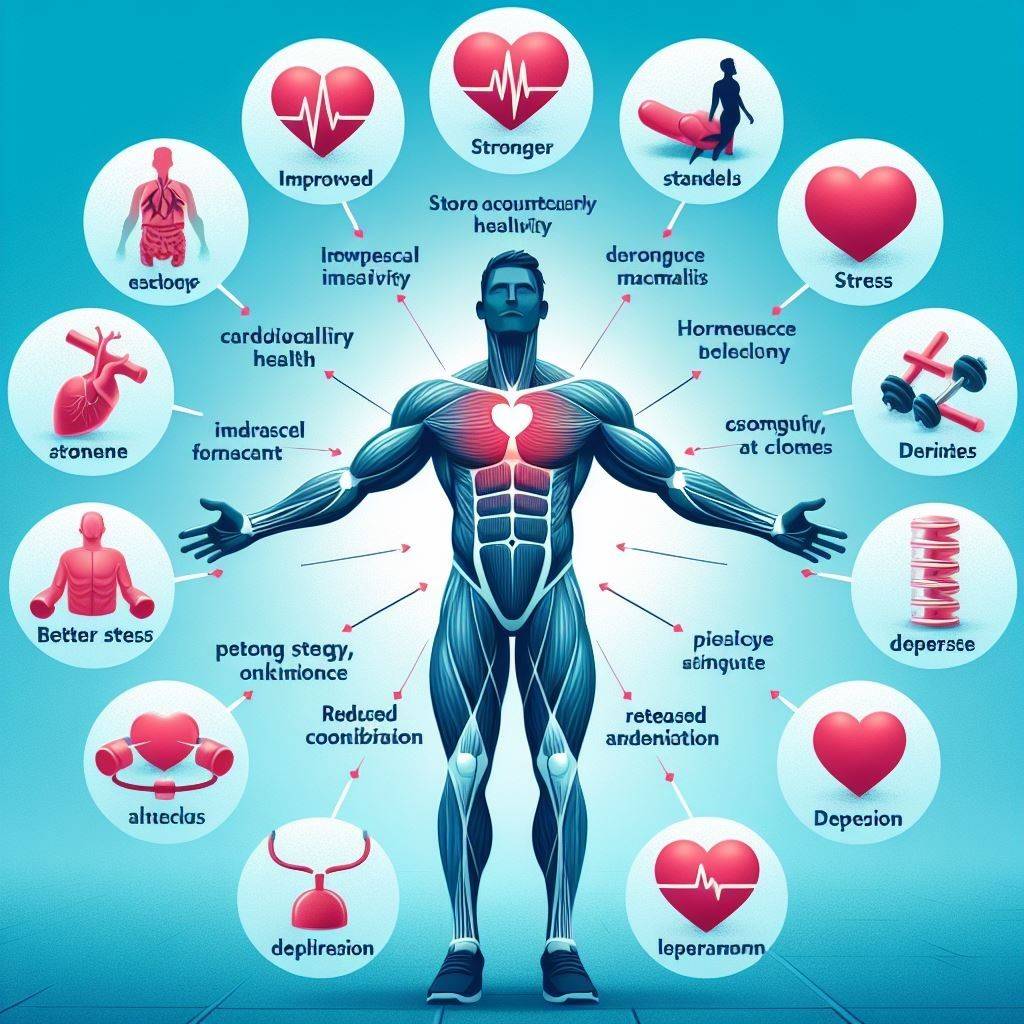Best 12 Benefits of Physical Activity: How Moving Your Body Boosts Your Brain
Explore the top 12 benefits of physical activity and discover how moving your body enhances brain function. Uncover the power of exercise now!
Introduction
Physical activity provides a wide range of benefits of physical activity for both your body and mind. Getting the recommended amount of exercise each week can help boost your health, improve your mood, and support your brain function. In this article, we’ll explore the top 12 evidence-based benefits of physical activity and how moving your body can transform your health.
Key Benefits of Physical Activity briefly
Before diving into the details, here is a quick overview of some of the major benefits of physical activity:
- Improves heart and lung health.
- Lowers risk of chronic diseases
- Strengthens muscles and bones.
- Supports mental health.
- Enhances brain function.
- Boosts energy and mood
- Aids weight management
- Extends lifespan.
- Reduces pain.
- Helps sleep better.
- Builds confidence and self-esteem.
- Provides social benefits.
Top 12 Benefits of Physical Activity
Now let’s explore each of these benefits of physical activity in more depth.
-
Improves Heart and Lung Health
Regular physical activity is one of the best things you can do for your heart. Exercise makes your heart muscle stronger and more efficient at pumping blood throughout your body. It also helps your lungs process oxygen more effectively.
According to the American Heart Association, 150 minutes per week of moderate physical activity can lower your risk of heart disease and stroke by up to 50%. Some research has found that doubling the amount of exercise can reduce your cardiovascular risk even further.
- Lowers Risk of Chronic Diseases
Lack of exercise is a primary cause behind many chronic health conditions like type 2 diabetes, obesity, and metabolic syndrome. Engaging in regular physical activity can help prevent or manage these chronic diseases.
For example, just 30 minutes a day of moderate-to-vigorous physical activity can reduce your risk of developing type 2 diabetes by over 25%. For those who already have diabetes, exercise helps improve blood sugar control.
Physical activity also helps reduce excess body fat and maintain a healthy body weight, which lowers your risk for obesity-related conditions.
-
Strengthens Muscles and Bones
From your legs to your arms, regular exercise builds strong, defined muscles. Weight-bearing activities like running, jumping, and lifting weights also help build bone density.
This is especially important as you age since muscle mass and bone density both decline with age. Maintaining muscle strength can help reduce your risk of falls and fractures.
Aim for at least 2 days per week of muscle-strengthening exercises like weightlifting or bodyweight exercises. Yoga and Pilates can also help strengthen your muscles.
Exercise successfully for your mental well-being. It can help boost stress, boost mood, increase relaxation, and improve self-esteem.
During exercise, your brain releases feel- chemicals called endorphins. This is what produces the “runner’s high” that makes you feel euphoric after a workout.
Adequate physical activity can also reduce symptoms of anxiety and depression. It may work as well as antidepressant medication in some cases.
-
Enhances Brain Function
Regular physical activity has many benefits for health. Exercise boosts brain function, reduces cognitive decline, and lowers dementia risk. Studies show it improves memory, reasoning, and problem-solving. Aim for 150 minutes of moderate exercise weekly, plus strength training twice. Start slowly and find enjoyable activities to stay motivated.
-
Boosts Energy and Mood
Regular physical activity has many benefits for health. Feeling tired or sluggish? Go for a walk or hit the gym. Benefits of Physical Activity Exercise delivers oxygen, glucose, and nutrients to your tissues, boosting energy levels. Additionally, training your muscles requires energy, making your body more efficient. Exercise also enhances mood by stimulating the release of endorphins and other feel hormones. Aim for 150 minutes of moderate exercise weekly, plus strength training twice. Start slowly and find enjoyable activities to stay motivated.
-
Aids Weight Management
Want an effective way to maintain or lose weight? Regular physical activity is key. Exercise burns calories and builds metabolically active muscle mass which helps raise your resting metabolism.
Studies show that 60-75 minutes of moderate activity most days of the week can spur significant weight loss over time without drastic dieting. Strength training also boosts muscle definition.
Exercise supports long-term weight loss maintenance as well, which is critical for keeping excess pounds off.
-
Extends Lifespan
Staying physically active can help you live longer. Studies consistently link higher levels of physical activity to reduced risk of premature death.
For example, 150 minutes per week of moderate exercise may reduce the risk of mortality by up to 30% compared to inactive people. The benefits are dose-dependent, meaning more exercise leads to greater reductions in mortality risk.
Fitness protects longevity by strengthening the heart, enhancing the immune system, and reducing inflammation throughout the body.
-
Reduces Pain
Whether you suffer from back pain, arthritis, fibromyalgia, or another condition, exercise can help reduce your pain levels and improve physical function.
Low-affected activities like walking, cycling, water workouts, and yoga are best for pain relief. Strength training also helps by building muscles around joints for added support.
Aim to slowly increase your activity time and intensity. Moving more can reduce pain signals to the brain. But be sure to take rest days to avoid overdoing it.
-
Helps Sleep Better
Having trouble sleeping or staying asleep? Daily exercise promotes quality shut-eye.
It helps synchronize your circadian rhythms, so you feel sleepy at bedtime. It also tires your muscles out, reduces anxiety, and cools down your body temperature naturally.
Avoid vigorous workouts close to bedtime, which may make it harder to fall asleep. However, regular afternoon or morning exercise can improve sleep quality and duration.
-
Builds Confidence and Self-Esteem
Physical activity is empowering. It helps you feel stronger, fitter and proud as you achieve fitness goals. Exercising also provides an opportunity for self-care to focus your energy on yourself.
Plus, the mood-boosting effects of exercise make you feel more positive about your body. Working out can also connect you with like-minded people and build self-confidence.
-
Provides Social Benefits
Exercising regularly allows you to meet new people and spend time with friends. Joining sports teams, classes, hiking clubs, or other activity groups helps you form meaningful connections.
Having an exercise partner or group helps motivate you to stick to your routine. It also makes working out more fun.
Studies show having social support helps increase dedication to your fitness regimen for better health results.
In Conclusion, regular physical activity provides numerous benefits for both physical and mental health. Feeling tired? Exercise boosts energy levels by delivering oxygen and nutrients to tissues. Additionally, it enhances mood by releasing feel-hormones. Aim for 150 minutes of moderate exercise weekly, plus strength training twice. Start slowly and find enjoyable activities to stay motivated.
How to Incorporate More Physical Activity into Your Routine

Discover the transformative power of physical activity. Benefits of Physical Activity Making it a habit takes effort, but there are creative ways to add extra movement to your routine. Exercise boosts energy and mood, aiming for 150 minutes weekly. Start slowly and find enjoyable activities to stay motivated.
Here are some tips for getting the recommended 150 minutes of moderate physical activity per week:
- Walk during lunch break.
- Schedule exercise time on your calendar
- Take the stairs.
- Try active commute options like walking, biking, or parking further away.
- Stand up every 30 mins if you have a desk job.
- Join an adult sports league.
- Put on music and dance while you clean and cook.
- Do bodyweight exercises like planks and squats during TV commercials.
- Take 5-10 min walking breaks throughout your workday.
- Go sightseeing on foot instead of driving when travelling.
- Do yardwork and gardening.
- Stand when chatting on the phone.
- Get a wearable tracker to monitor your daily activity.
Any movement counts toward your 150 weekly minute goal. The key is finding easy ways to sneak extra activity into your normal routine. Start slow if needed and accumulate your duration and intensity.
Here is a sample weekly workout schedule to give you an idea of how to fit in 150 minutes:
Sample Weekly Exercise Schedule
| Day | Activity | Duration |
| Monday | Brisk walk | 30 minutes |
| Tuesday | Yoga class | 60 minutes |
| Wednesday | Walk during lunch break | 30 minutes |
| Thursday | Jog | 45 minutes |
| Friday | Bike commute to work | 30 minutes |
| Saturday | Hike with friend | 60 minutes |
| Total | 255 minutes |
As you can see, it’s easy to accumulate 150 minutes over a week through daily short workouts. Just 2-3 sessions of 30-60 minutes of moderate exercise per week meet the recommended minimum.
Consistency is key – make physical activity a part of your lifestyle by scheduling time for it. But be flexible and listen to your body’s needs day-to-day.
Final Tips for Success
Here are some final tips to help you successfully increase your physical activity:
- Find activities you enjoy – this makes exercise fun and does not feel like a chore.
- Invest in quality shoes for running, walking, or sports.
- Vary your workouts to prevent boredom and overuse injuries.
- Recruit a friend. – exercising together provides motivation.
- Track your workouts – logs or fitness trackers can help monitor progress.
- Reward yourself after reaching small goals to stay motivated.
- Don’t overdo it – rest days are important to prevent burnout.
The health benefits of physical activity are clear. Invest in your body by moving a daily habit. Start small and build up at a pace that feels good for you. Your mind and body will thank you!
Wrap-up
Regular physical activity provides a long list of benefits for both your physical and mental health. Benefits of Physical Activity Aim for 150 minutes per week of moderate exercise like brisk walking, plus muscle-strengthening activities 2 times per week. Consistency is key. – make daily movement a habit by finding creative ways to incorporate activity into your routine. Start slow and find exercises you enjoy staying motivated. Investing in regular physical activity can transform your health, so get moving today!

Adel Galal is a health and wellness writer with over 30 years of experience studying and writing about health, fitness, nutrition, and healthy living. He is the founder of NextFitLife.com, where he shares practical, evidence-based guidance to support long-term health at any age. Adel’s mission is simple:
to help people make smarter health choices that fit real life, at any age.



